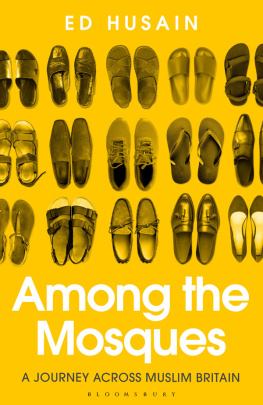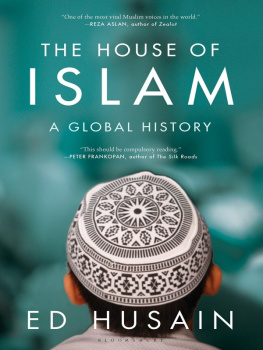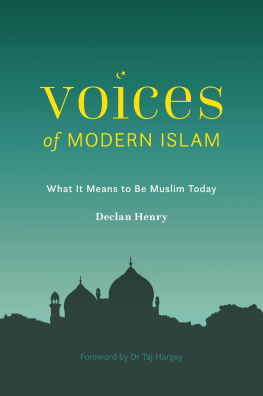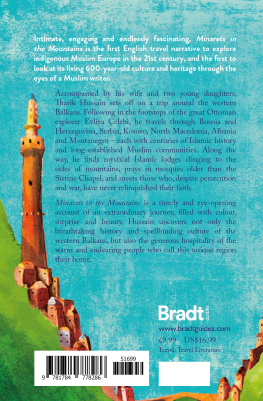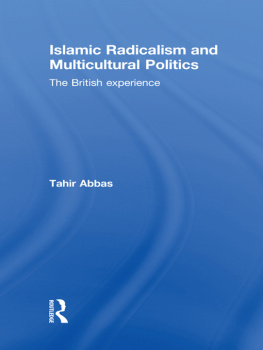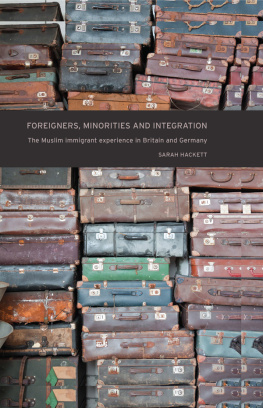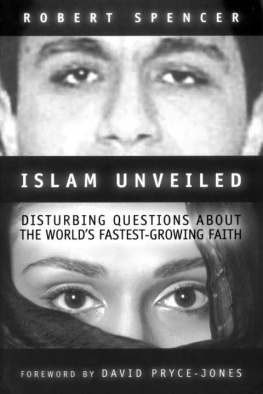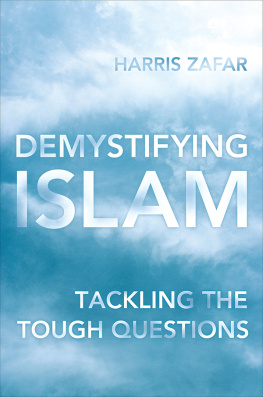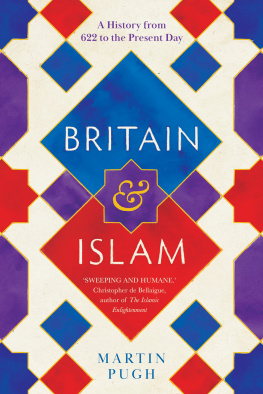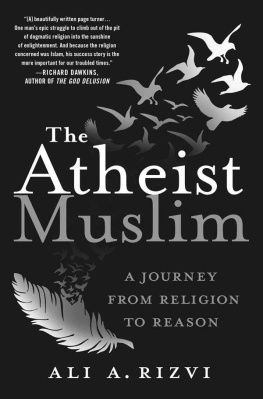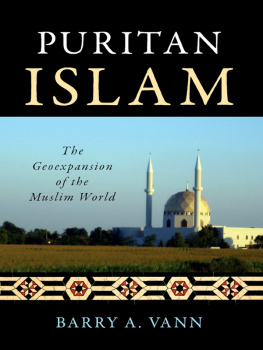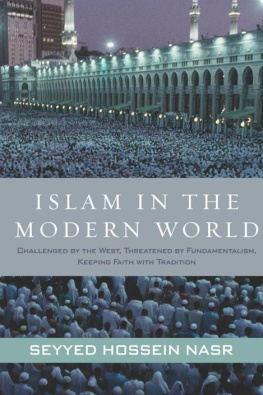Among the Mosques

BLOOMSBURY PUBLISHING
Bloomsbury Publishing Plc
50 Bedford Square, London, WC 1 B 3 DP , UK
29 Earlsfort Terrace, Dublin 2, Ireland
BLOOMSBURY, BLOOMSBURY PUBLISHING and the Diana logo are trademarks of Bloomsbury Publishing Plc
First published in Great Britain 2021
Copyright Ed Husain, 2021
Ed Husain has asserted his right under the Copyright, Designs and Patents Act, 1988, to be identified as Author of this work
For legal purposes the on p. 319
constitute an extension of this copyright page
Some names and details of individuals have been changed to preserve their anonymity
All rights reserved. No part of this publication may be reproduced or transmitted in any form or by any means, electronic or mechanical, including photocopying, recording, or any information storage or retrieval system, without prior permission in writing from the publishers
Bloomsbury Publishing Plc does not have any control over, or responsibility for, any third-party websites referred to or in this book. All internet addresses given in this book were correct at the time of going to press. The author and publisher regret any inconvenience caused if addresses have changed or sites have ceased to exist, but can accept no responsibility for any such changes
A catalogue record for this book is available from the British Library
ISBN: HB: 978-1-5266-1865-8; eBook : 978-1-5266-1866-5
2 4 6 8 10 9 7 5 3 1
Typeset by Newgen KnowledgeWorks Pvt. Ltd., Chennai, India
Printed and bound in Great Britain by CPI Group (UK) Ltd, Croydon CR0 4YY
To find out more about our authors and books visit www.bloomsbury.com and sign up for our newsletters
To all the brave women and men who laid down their lives in two world wars for the liberties that we now cherish. They came from all continents. Travelling across Britain made me more aware of our debt to them; this book is a contribution to that generational conversation.
by the same author
The Islamist
The House of Islam
Contents
Muslims are the fastest growing community in Britain. The religious, political and social direction of travel inside this demographic will shape the future of this country.
A hundred years ago, there were two mosques in England. There was a small terraced house in Ottomans in England.
Along with the British Empires rise and fall, its Muslim populations ebbed and flowed. Disraeli liked to remind Queen Victoria that she was the queen-empress of more Muslims in her domain than the Turkish sultan in his. British Muslims are the grandchildren of the British Empire.
Today, there are almost 2,000 mosques in Britains towns and cities. On some roads, we have multiple mosques to cater for sectarian, ethnic and tribal differences. The Turks, Arabs, Pakistanis and Indians all want their own mosques in parts of north London, for example. The differences among Muslims constantly call on our tolerance levels as local councils are being lobbied daily to approve new mosques. Liverpool and Woking were open places of learning and discussion, but what of todays mosques? What is happening inside mosques and how do these institutions influence the lives and localities in which they are established? The skylines of Luton, Slough, Nelson, Birmingham, Leicester, Bradford, Dewsbury, Keighley, Blackburn and the London suburb of Hounslow are changing, with minarets, domes and mosques appearing more frequently. Who is behind this proliferation of mosques? What type of mosques are they?
I visited nine major towns and cities across Great Britain in order to write this book. Always, I turned up unannounced at the central mosque or at the largest weekly gathering: communal Friday prayers, to experience its sermon, its announcements and its conversations. I also visited mosques that are prominent for locals, even if they are not the central mosque. I stopped people in streets. Wherever and whenever I had a question, I mostly asked. Where I failed to do so, I confess that too.
Between 2001 and 2016, the whole population of England grew 10.9 per cent from 49,128,831 to a general population of 54,516,822, according to Britains largest independent producer of official statistics, the Office for National Statistics (ONS). At the same time, the Muslim population of England grew by 107.3 per cent, going from 1,524,877 in 2001 to 3,161,629 people by 2016. The Muslim population in Britain is estimated to be thirteen million people by 2050.
In 2004, the Home Office predicted the arrival of no more than 13,000 Christian Europeans, what is the fate of its Muslims? We must not shy away from these difficult questions: for, if we do, extremist voices will force a future upon us that will be divisive and destructive.
By 2031, based on the ONS census of 200111 projections, several areas in Bradford, Blackburn, Birmingham, Leicester, Slough, Luton and some London boroughs will be Muslim-majority. What implications will that have, and how will it change power dynamics for the wider population?
I am a Muslim. For most of my life I have lived in London, but I spent two years studying Arabic and Islam in Damascus, Syria (20035). I have lived in Jeddah, Saudi Arabia, for almost a year (2006). I have also worked and lived in New York and Washington DC (201015) and I believe in the world we have inherited: cosmopolitan, multi-ethnic, multi-faith, open, liberal and secular.
Based on my family and faith background, I was able to converse in the various languages, both cultural and linguistic, of the people I met across Britain. My studies and my travels in Turkey, Syria, Israel, Egypt, India and the Arabian Gulf have given me an awareness of the different ways of being Muslim in varied contexts that still remain loyal to the spirit of my religion. My assumptions from the outset while writing this book were that organised religion is a force for good; community is something positive and to be supported; clerics and religious leaders are generally sincere people committed to virtue. I assumed that the concept of a caliphate was something from history, and attempts by the Taliban or ISIS to resurrect the imperial past of Islam in recent years has led to failure. Therefore, most Muslims living in a liberal democracy will have little truck with a caliph, or the yearning for a caliphate, either now or for the future.
During the course of writing this book, my view of my own country, continent, community and city has changed. My starting point was, and remains, honesty in outlook and behaviour. With an open mind, I went out to the towns and cities of England, Scotland, Wales and Northern Ireland. I thought we were Europeans and had a sense of history, present and future direction. Great Britain is a country that, despite our faults, still provides intellectual leadership around the world. Developments here matter to thinking people in Africa, Europe, Asia and America. We forget that our language, laws and liberties are the bedrock of the modern world. Philosophers from these islands, John Locke, David Hume, Adam Smith, Edmund Burke and John Stuart Mill, shaped the cultures and constitutions of countless countries.
My editor at Bloomsbury, Michael Fishwick, encouraged me to ask questions and be open to their answers. I followed the crumbs; I was led by observations, conversations, by leads, by suggestions. I questioned as much as decently possible. I went everywhere, every mosque, every bookshop, clinic, community centre, shelter, street, town and city that my interviewees recommended.
Nothing less than the future of our country depends on us studying, debating and deciding together where we are headed. If we do not consciously shape our own future, forewarned and forearmed, we will be shaped by it. As Heraclitus of Ephesus warned five centuries before Christ, life is all about change; change is the only constant. We cannot even step into the same river twice, taught Heraclitus. The problem is not that the Muslim population is increasing: the question is what type of Islam is on the rise in British mosques.
Next page
